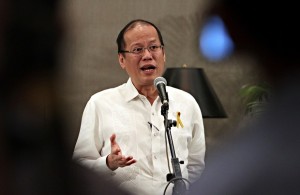Justices: President usurped Congress power of the purse
MANILA, Philippines–President Benigno Aquino III overstepped his powers while his budget secretary may have consciously circumvented the law in hatching “noble” initiatives designed to stimulate the economy, five justices said in separate concurring opinions on the Supreme Court decision striking down the Disbursement Acceleration Program (DAP).
The justices said that Aquino had “usurped” Congress’ power of the purse and that Budget Secretary Florencio Abad “may have knowingly” created an unconstitutional program given his experience in the workings of state funds.
In a decision penned by Associate Justice Lucas Bersamin, the court unanimously declared the DAP unconstitutional, particularly the realignment of Malacañang’s savings to other projects outside the approved national budget and without certification from the state treasury.
The ruling said that the effects of the DAP done in good faith—“roads, bridges, homes for the homeless, hospitals, classrooms and the like”—before its nullification may remain untouched per the doctrine of operative fact.
Such principle may, however, not apply on the program’s sponsors unless they could prove good faith before the proper tribunal. This implied the liability of the DAP’s “authors, proponents and implementors.”
Article continues after this advertisementAssociate Justice Teresita de Castro inhibited herself from the ruling, while five of the 13 who voted to nullify the DAP opted to issue separate opinions, copies of which were released to the public on Wednesday night.
Article continues after this advertisementNotably, Chief Justice Maria Lourdes Sereno, who had issued separate opinions in previous big cases involving the executive branch, did not release her own this time.
Carpio’s, Bernabe’s opinions
In his 27-page opinion, Associate Justice Antonio Carpio cited how the DAP and National Budget Circular No. 541 in 2012 allowed the transfer of unused funds for projects and programs outside the Congress-approved General Appropriations Act (GAA).
“Under the DAP and NBC 541, the President disregards the specific appropriations in the GAA and treats the GAA as the President’s self-created all-purpose fund, which the President can spend as he chooses without regard to the specific purposes for which the appropriations are made in the GAA,” Carpio said.
“In short, the President under the DAP and NBC 541 usurps the power of the purse of Congress, making Congress inutile and a surplusage,” said the magistrate, even as he noted the DAP’s intent “to fast-track public spending and push economic growth.”
An eight-page opinion from Associate Justice Estela Perlas-Bernabe echoed this view, saying the President should remember the bounds of his budgetary prerogative.
“Ultimately, notwithstanding any confusion as to the DAP’s actual workings or the laudable intentions behind the same, the one guiding principle to which the executive should be respectfully minded is that no policy or program of government can be adopted as an avenue to wrest control of the power of the purse from Congress,” Bernabe said.
Brion
Associate Justice Arturo Brion drew parallels between the DAP and the Priority Development Assistance Fund (PDAF), congressional discretionary funds also found unconstitutional in November 2013 in light of allegations that it had been disbursed to ghost projects and bogus nongovernment organizations in a deeply entrenched scheme involving legislators and businesswoman Janet Lim-Napoles.
He cited how the amount involved, at P150 billion, was “almost 15 times” the P10-billion PDAF case.
Brion said the DAP case “involves circumstances that are similar to the PDAF and much more,” as it involved top officials and “demonstrated the lack of respect for public funds, institutions and the Constitution.”
In particular, he chastised Abad for executing a program that a man of his experience in national appropriations—having served in Congress for 12 years and even at one time chair of the House appropriations committee—could have easily spotted as unconstitutional.
“There are indicators showing that the DBM secretary might have established the DAP knowingly aware that it is tainted with unconstitutionality,” Brion said.
“As a lawyer and with at least 12 years of experience behind him as a congressman who was even the chair of the House appropriations committee, it is inconceivable that he did not know the illegality or unconstitutionality that tainted his brainchild,” he said.
Given Abad’s knowledge about how the national budget worked, Brion said it was “not hard to believe that he can run circles around the budget and its processes, and did, in fact, purposely use this knowledge for the administration’s objective of gathering the very sizable funds collected under the DAP.”
Leonen
Associate Justice Marvic Leonen cautioned against inferring from the tribunal’s ruling the liability of those involved in the DAP.
“Whether the constitutional violation is in good faith or in bad faith, or whether any administrative or criminal liability is forthcoming, is the subject of other proceedings in other forums,” said Leonen, an Aquino appointee.
“Likewise, to rule that a declaration of unconstitutionality per se is the basis for determining liability is a dangerous proposition. It is not proper that there are suggestions of administrative or criminal liability even before the proper charges are raised, investigated and filed,” he said in his 29-page opinion.
He recommended that disbursements under the DAP be audited, saying evidence submitted by the respondents (Malacañang) to court should be forwarded to the Commission on Audit “for their appropriate action.”
“Our decision today should not be misinterpreted as authority to undo infrastructure built or expenditures made under the DAP. Nor should it be immediately used as basis for saying that any or all officials or beneficiaries are either liable or not liable. Each expenditure must be audited in accordance with our ruling,” said Leonen.
Del Castillo
Associate Justice Mariano del Castillo called for public vigilance. “Ultimately… the remedy resides in the people: To press for needed reforms in the laws that currently govern the enactment and execution of the national budget and to be vigilant in the prosecution of those who may have fraudulently abused or misused public funds,” he said.
RELATED STORIES
Justice Carpio: Aquino ‘castrated’ Congress’ power of the purse
SC declares parts of DAP unconstitutional
